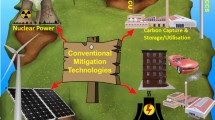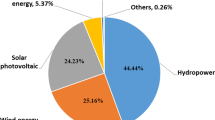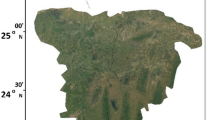Abstract
In recent decades, Moscow has experienced the impact of remarkable climate changes on a scale that has significantly exceeded the climate changes in most of the world’s populated regions. Analysis of operation of the Moscow energy system under these new conditions has allowed us to reveal that the climate changes have determined alleviation of energy supply requirements during the cold season, contributed to decreased overall energy consumption, and led to reduced seasonal irregularity of the annual power load schedule. The results of this study allow us to conclude that an increase in the annual-mean temperature by 3–4°C in temperate and cold climate zones for continental regions brings no apparent negative consequences for operation of the energy system.
Similar content being viewed by others
References
C. P. Morice, J. J. Kennedy, N. A. Rayner, and P. D. Jones, J. Geophys. Res. 117, D08101 (2012). doi 10.1029/2011JD017187
S. A. Marcott, I. D. Shakun, P. V. Clark, and A. C. Mix, Science 339 (6124), 1198 (2013).
V. V. Klimenko, Dokl. Earth Sci. 440 (2), 1419 (2011).
Climate Change 2013: The Physical Science Basis. Contribution of Working Group I to the Fifth Assessment Report of the Intergovernmental Panel on Climate Change, Ed. by T. F. Stocker, D. Qin, G.-K. Plattner (Cambridge Univ., Cambridge, 2013).
K. Keller, M. G. Hall, S. R. Kim, D. F. Bradford, and M. Oppenheimer, Clim. Change 73 (3), 227 (2005).
M. New, D. Liverman, H. Schröder, and K. Anderson, Phil. Trans. R. Soc. Ser. A 369 (1934), 6 (2011).
J. E. Hansen, Clim. Change 68 (3), 269 (2005).
J. H. Lawrimore, M. J. Menne, B. E. Gleason, C. N. Williams, D. B. Wuertz, R. S. Vose, and J. Rennie, J. Geophys. Res. 116 (D19121) (2011). doi 10.1029/2011JD016187
M. A. Lokoshchenko, Urban Clim. 10, 550 (2014). doi 10.1016/j.uclim.2014.01.008
V. V. Klimenko, A. S. Ginzburg, P. F. Demchenko, A. G. Tereshin, I. N. Belova, and E. V. Kasilova, Dokl. Phys. 470 (5), 521 (2016).
V. V. Klimenko, A. V. Klimenko, A. G. Tereshin, D. S. Beznosova, and T. N. Andreichenko, Teploenergetika, No. 11, 3 (2012).
B. I. Makoklyuev, Energy Edinoi Seti, No. 4, 56 (2012) [in Russian].
R. Knutti, IPCC Working Group I AR5 Snapshot: The RCP4.5 Experiment (World Data Center for Climate, 2014). doi 10.1594/WDCC/ETHr4
O. N. Bulygina, V. N. Razuvaev, and T. M. Aleksandrova, Database of Daily Air Temperature and Precipitation at Meteorological Stations in Russia and Former USSR (VNIIGMI-World Data Center, 2016) [in Russian].
V. V. Klimenko, A. V. Klimenko, E. V. Kasilova, E. S. Rekunenko, and A. G. Tereshin, Therm. Eng. 63 (10), 690 (2016).
Author information
Authors and Affiliations
Corresponding author
Additional information
Original Russian Text © V.V. Klimenko, A.G. Tereshin, E.V. Kasilova, 2017, published in Doklady Akademii Nauk, 2017, Vol. 477, No. 1, pp. 30–34.
Rights and permissions
About this article
Cite this article
Klimenko, V.V., Tereshin, A.G. & Kasilova, E.V. Moscow: A natural testing area for strong warming impact assessment. Dokl. Phys. 62, 527–531 (2017). https://doi.org/10.1134/S102833581709004X
Received:
Published:
Issue Date:
DOI: https://doi.org/10.1134/S102833581709004X




